Phrases that Nurture Respect, Confidence, and Community | Abundant Life Children
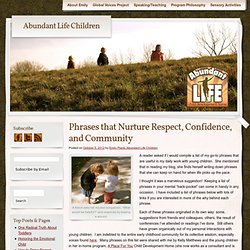 A friend asks her injured companion, “What would be helpful?” and responds by kissing a wound. A reader asked if I would compile a list of my go-to phrases that are useful in my daily work with young children. She mentioned that in reading my blog, she finds herself writing down phrases that she can keep on hand for when life picks up the pace. I thought it was a marvelous suggestion! Each of these phrases originated in its own way: some, suggestions from friends and colleagues, others, the result of conferences I’ve attended or readings I’ve done. And now, the list: What would be helpful? Now, for all the readers who would like a quick reference sheet, I created this just for you (from scratch, with my limited Photoshop skills…golf clap, everyone)! Like this: Like Loading...
A friend asks her injured companion, “What would be helpful?” and responds by kissing a wound. A reader asked if I would compile a list of my go-to phrases that are useful in my daily work with young children. She mentioned that in reading my blog, she finds herself writing down phrases that she can keep on hand for when life picks up the pace. I thought it was a marvelous suggestion! Each of these phrases originated in its own way: some, suggestions from friends and colleagues, others, the result of conferences I’ve attended or readings I’ve done. And now, the list: What would be helpful? Now, for all the readers who would like a quick reference sheet, I created this just for you (from scratch, with my limited Photoshop skills…golf clap, everyone)! Like this: Like Loading...
From WikiEducator Download a print version of these instructions (550KB) Introduction Welcome aboard WikiEducator's Learning4Content (L4C) project! You are making history by participating in the world's largest training initiative in promoting wiki skills for free content development in education. These instructions will help you get started. Duration and time commitments Total time commitment: between 4 - 5 learning hours Number of tutorials: There are ten tutorials which you should work through during the course of the workshop. Overview of the technology we use The aim of an online L4C workshop is to learn how to use a wiki so most of our activities will take place in the wiki. Please note the following: Your facilitators will post the instructions for each days' activities in WikiEducator on the course homepage. Instructions for getting started You should have received an email with the link to these instructions and the course homepage. Step 1 - Orientation Read through this document.
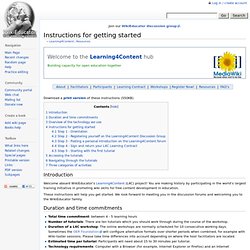
Learning4Content/Resources/Getting started
Many practicing Special Education teachers have found that the most effective and efficient “adaptations” are actually teaching strategies embedded right into daily and weekly lessons, learning activities, and assessment practices. All students benefit from these adaptations while providing the extra advantage of not publicly identifying any specific students. Any teaching strategies which incorporate visuals and formatting structures have been proven to be of significant help to learners. Below you will find references and examples of several such strategies that scaffold learning, allowing all students to actively learn and to respond in ways which demonstrate their learning. General BC Ministry of Education Guide to Adaptations and Modifications, August 2009. Graphic organizers Writing organizers Anita Archer AcademicResources shared with Utah Personnel Development Center on writing and reading instruction.
BCTF > Teaching to Diversity resource inventory: Resources – Adaptations
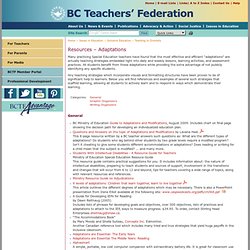
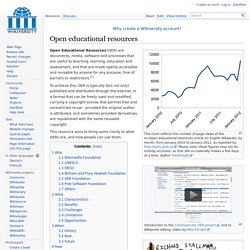 This chart reflects the number of page views of the en:Open educational resources article on English Wikipedia, by month, from January 2010 to January 2012, as reported by Please note, these figures may not be entirely accurate, as that site occasionally misses a few days at a time. Author Peteforsyth Drawn from Richard Stallman's video "What is free software?". Open Educational Resources (OER) are documents, media, software and processes that are useful to teaching, learning, education and assessment, and that are made openly accessible and reusable by anyone for any purpose, free of barriers or restrictions.[1] To achieve this, OER is typically (but not only) published and distributed through the Internet, in a format that can be freely used and modified, carrying a copyright license that permits free and unrestricted reuse - provided the original author is attributed, and sometimes provided derivatives are republished with the same reusable copyright. Who[edit]
This chart reflects the number of page views of the en:Open educational resources article on English Wikipedia, by month, from January 2010 to January 2012, as reported by Please note, these figures may not be entirely accurate, as that site occasionally misses a few days at a time. Author Peteforsyth Drawn from Richard Stallman's video "What is free software?". Open Educational Resources (OER) are documents, media, software and processes that are useful to teaching, learning, education and assessment, and that are made openly accessible and reusable by anyone for any purpose, free of barriers or restrictions.[1] To achieve this, OER is typically (but not only) published and distributed through the Internet, in a format that can be freely used and modified, carrying a copyright license that permits free and unrestricted reuse - provided the original author is attributed, and sometimes provided derivatives are republished with the same reusable copyright. Who[edit]
Open educational resources - Wikiversity
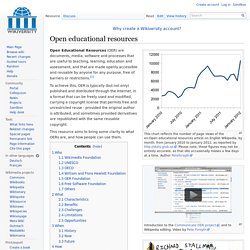 This chart reflects the number of page views of the en:Open educational resources article on English Wikipedia, by month, from January 2010 to January 2012, as reported by Please note, these figures may not be entirely accurate, as that site occasionally misses a few days at a time. Author Peteforsyth Drawn from Richard Stallman's video "What is free software?". First drawing from the five panels. Open Educational Resources (OER) are documents, media, software and processes that are useful to teaching, learning, education and assessment, and that are made openly accessible and reusable by anyone for any purpose, free of barriers or restrictions.[1] This resource aims to bring some clarity to what OERs are, and how people can use them. Who[edit] OER has a number of interests, from international agencies like the United Nations, through to individual practitioners who share many of the principles and values. Wikimedia Foundation[edit] UNESCO[edit] OECD[edit] Others[edit]
This chart reflects the number of page views of the en:Open educational resources article on English Wikipedia, by month, from January 2010 to January 2012, as reported by Please note, these figures may not be entirely accurate, as that site occasionally misses a few days at a time. Author Peteforsyth Drawn from Richard Stallman's video "What is free software?". First drawing from the five panels. Open Educational Resources (OER) are documents, media, software and processes that are useful to teaching, learning, education and assessment, and that are made openly accessible and reusable by anyone for any purpose, free of barriers or restrictions.[1] This resource aims to bring some clarity to what OERs are, and how people can use them. Who[edit] OER has a number of interests, from international agencies like the United Nations, through to individual practitioners who share many of the principles and values. Wikimedia Foundation[edit] UNESCO[edit] OECD[edit] Others[edit]
Open educational resources - Wikiversity
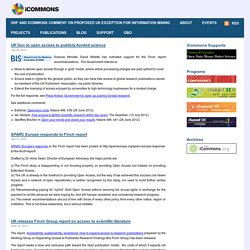 UK Gov to open access to publicly-funded science July 25, 2012 Science Minister David Willetts has indicated support for the Finch report recommendations. The Government intends to: Move to deliver open access through a ‘gold’ model, where article processing-charges are paid upfront to cover the cost of publication.Ensure walk-in rights for the general public, so they can have free access to global research publications owned by members of the UK Publishers’ Association, via public libraries.Extend the licensing of access enjoyed by universities to high technology businesses for a modest charge. For the full response, see Press Notice: Government to open up publicly funded research. See additional comments : Editorial, Openness costs, Nature 486, 439 (28 June 2012)Ian Sample, Free access to British scientific research within two years, The Guardian, (15 July 2012)Geoffrey Boulton in Open your minds and share your results, Nature 486, 441 (28 June 2012) SPARC Europe responds to Finch report
UK Gov to open access to publicly-funded science July 25, 2012 Science Minister David Willetts has indicated support for the Finch report recommendations. The Government intends to: Move to deliver open access through a ‘gold’ model, where article processing-charges are paid upfront to cover the cost of publication.Ensure walk-in rights for the general public, so they can have free access to global research publications owned by members of the UK Publishers’ Association, via public libraries.Extend the licensing of access enjoyed by universities to high technology businesses for a modest charge. For the full response, see Press Notice: Government to open up publicly funded research. See additional comments : Editorial, Openness costs, Nature 486, 439 (28 June 2012)Ian Sample, Free access to British scientific research within two years, The Guardian, (15 July 2012)Geoffrey Boulton in Open your minds and share your results, Nature 486, 441 (28 June 2012) SPARC Europe responds to Finch report
iCommons.org - Virtual Learning - 10 Open Education Resources


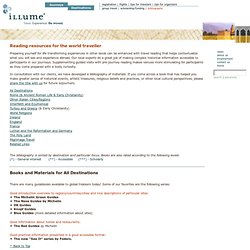
 A friend asks her injured companion, “What would be helpful?” and responds by kissing a wound. A reader asked if I would compile a list of my go-to phrases that are useful in my daily work with young children. She mentioned that in reading my blog, she finds herself writing down phrases that she can keep on hand for when life picks up the pace. I thought it was a marvelous suggestion! Each of these phrases originated in its own way: some, suggestions from friends and colleagues, others, the result of conferences I’ve attended or readings I’ve done. And now, the list: What would be helpful? Now, for all the readers who would like a quick reference sheet, I created this just for you (from scratch, with my limited Photoshop skills…golf clap, everyone)! Like this: Like Loading...
A friend asks her injured companion, “What would be helpful?” and responds by kissing a wound. A reader asked if I would compile a list of my go-to phrases that are useful in my daily work with young children. She mentioned that in reading my blog, she finds herself writing down phrases that she can keep on hand for when life picks up the pace. I thought it was a marvelous suggestion! Each of these phrases originated in its own way: some, suggestions from friends and colleagues, others, the result of conferences I’ve attended or readings I’ve done. And now, the list: What would be helpful? Now, for all the readers who would like a quick reference sheet, I created this just for you (from scratch, with my limited Photoshop skills…golf clap, everyone)! Like this: Like Loading...
 Learning4Content/Resources/Getting started
Learning4Content/Resources/Getting started

 This chart reflects the number of page views of the en:Open educational resources article on English Wikipedia, by month, from January 2010 to January 2012, as reported by Please note, these figures may not be entirely accurate, as that site occasionally misses a few days at a time. Author Peteforsyth Drawn from Richard Stallman's video "What is free software?". Open Educational Resources (OER) are documents, media, software and processes that are useful to teaching, learning, education and assessment, and that are made openly accessible and reusable by anyone for any purpose, free of barriers or restrictions.[1] To achieve this, OER is typically (but not only) published and distributed through the Internet, in a format that can be freely used and modified, carrying a copyright license that permits free and unrestricted reuse - provided the original author is attributed, and sometimes provided derivatives are republished with the same reusable copyright. Who[edit]
Open educational resources - Wikiversity
This chart reflects the number of page views of the en:Open educational resources article on English Wikipedia, by month, from January 2010 to January 2012, as reported by Please note, these figures may not be entirely accurate, as that site occasionally misses a few days at a time. Author Peteforsyth Drawn from Richard Stallman's video "What is free software?". Open Educational Resources (OER) are documents, media, software and processes that are useful to teaching, learning, education and assessment, and that are made openly accessible and reusable by anyone for any purpose, free of barriers or restrictions.[1] To achieve this, OER is typically (but not only) published and distributed through the Internet, in a format that can be freely used and modified, carrying a copyright license that permits free and unrestricted reuse - provided the original author is attributed, and sometimes provided derivatives are republished with the same reusable copyright. Who[edit]
Open educational resources - Wikiversity
 This chart reflects the number of page views of the en:Open educational resources article on English Wikipedia, by month, from January 2010 to January 2012, as reported by Please note, these figures may not be entirely accurate, as that site occasionally misses a few days at a time. Author Peteforsyth Drawn from Richard Stallman's video "What is free software?". First drawing from the five panels. Open Educational Resources (OER) are documents, media, software and processes that are useful to teaching, learning, education and assessment, and that are made openly accessible and reusable by anyone for any purpose, free of barriers or restrictions.[1] This resource aims to bring some clarity to what OERs are, and how people can use them. Who[edit] OER has a number of interests, from international agencies like the United Nations, through to individual practitioners who share many of the principles and values. Wikimedia Foundation[edit] UNESCO[edit] OECD[edit] Others[edit]
Open educational resources - Wikiversity
This chart reflects the number of page views of the en:Open educational resources article on English Wikipedia, by month, from January 2010 to January 2012, as reported by Please note, these figures may not be entirely accurate, as that site occasionally misses a few days at a time. Author Peteforsyth Drawn from Richard Stallman's video "What is free software?". First drawing from the five panels. Open Educational Resources (OER) are documents, media, software and processes that are useful to teaching, learning, education and assessment, and that are made openly accessible and reusable by anyone for any purpose, free of barriers or restrictions.[1] This resource aims to bring some clarity to what OERs are, and how people can use them. Who[edit] OER has a number of interests, from international agencies like the United Nations, through to individual practitioners who share many of the principles and values. Wikimedia Foundation[edit] UNESCO[edit] OECD[edit] Others[edit]
Open educational resources - Wikiversity
 UK Gov to open access to publicly-funded science July 25, 2012 Science Minister David Willetts has indicated support for the Finch report recommendations. The Government intends to: Move to deliver open access through a ‘gold’ model, where article processing-charges are paid upfront to cover the cost of publication.Ensure walk-in rights for the general public, so they can have free access to global research publications owned by members of the UK Publishers’ Association, via public libraries.Extend the licensing of access enjoyed by universities to high technology businesses for a modest charge. For the full response, see Press Notice: Government to open up publicly funded research. See additional comments : Editorial, Openness costs, Nature 486, 439 (28 June 2012)Ian Sample, Free access to British scientific research within two years, The Guardian, (15 July 2012)Geoffrey Boulton in Open your minds and share your results, Nature 486, 441 (28 June 2012) SPARC Europe responds to Finch report
iCommons.org - Virtual Learning - 10 Open Education Resources
UK Gov to open access to publicly-funded science July 25, 2012 Science Minister David Willetts has indicated support for the Finch report recommendations. The Government intends to: Move to deliver open access through a ‘gold’ model, where article processing-charges are paid upfront to cover the cost of publication.Ensure walk-in rights for the general public, so they can have free access to global research publications owned by members of the UK Publishers’ Association, via public libraries.Extend the licensing of access enjoyed by universities to high technology businesses for a modest charge. For the full response, see Press Notice: Government to open up publicly funded research. See additional comments : Editorial, Openness costs, Nature 486, 439 (28 June 2012)Ian Sample, Free access to British scientific research within two years, The Guardian, (15 July 2012)Geoffrey Boulton in Open your minds and share your results, Nature 486, 441 (28 June 2012) SPARC Europe responds to Finch report
iCommons.org - Virtual Learning - 10 Open Education Resources